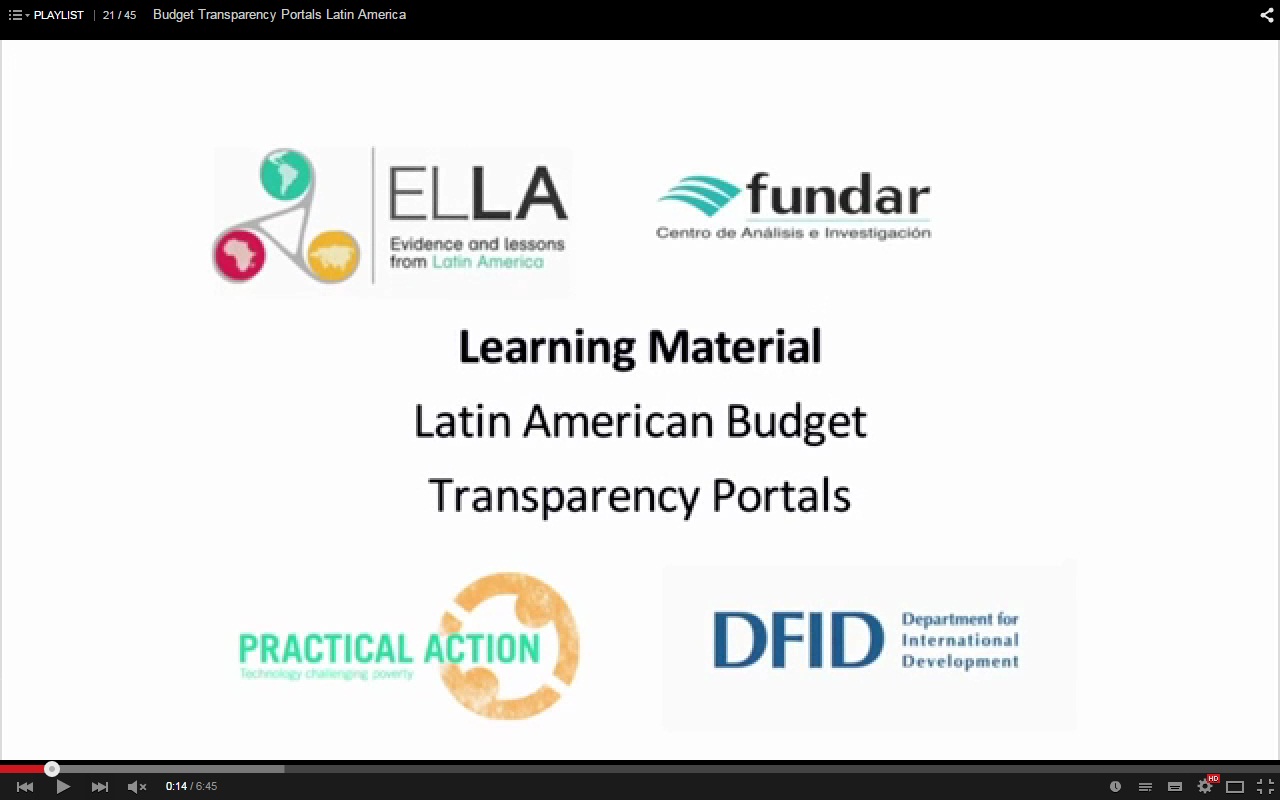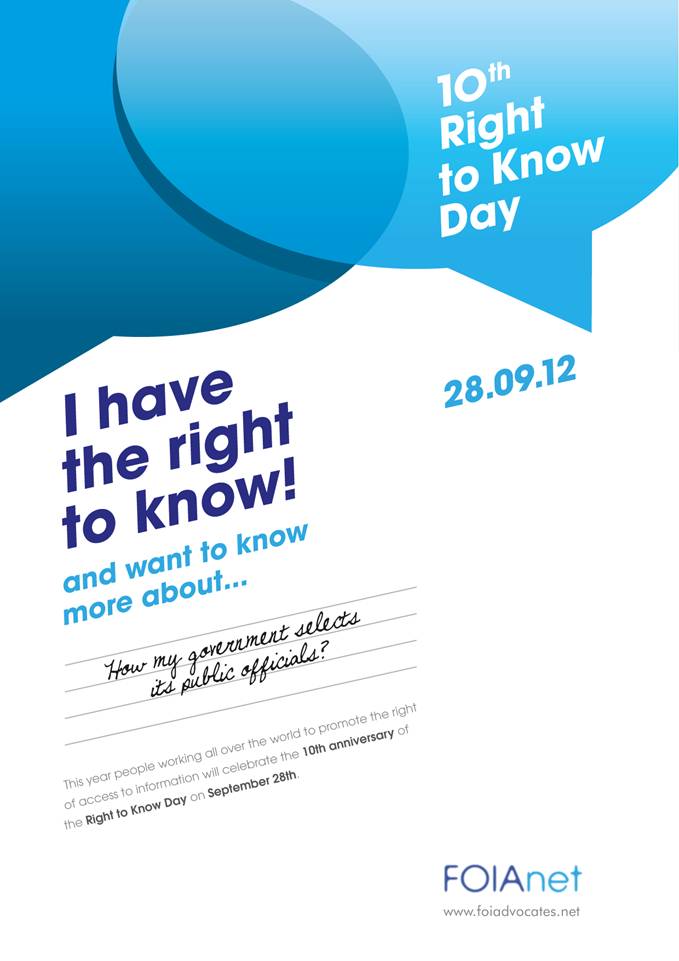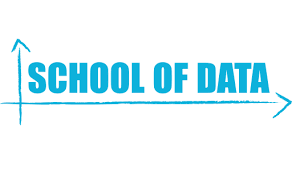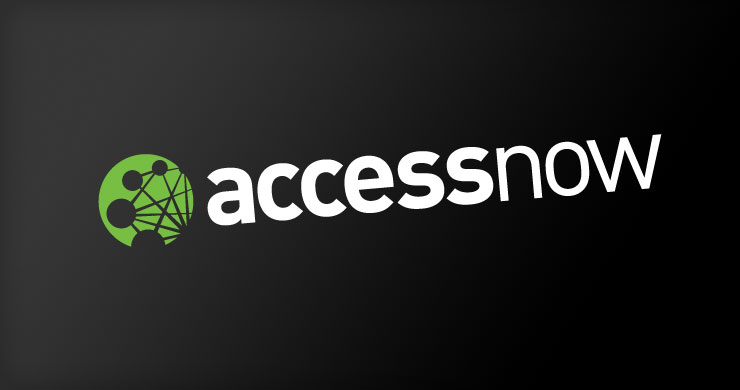Archives
If you would like access to the archives of the FOIAnet (which date back to 2008), you need to be a member of the discussion list. Members can access the archives by using a unique password to log in. If you do not know your password, all you need to do is ask for a reminder which will be sent to your email address.
Follow the instructions and access the archives by clicking here (this will take you away from FOIAdvocates.net).
Resources
Below, you will find publications, model laws, training materials for the public or public officials, useful links, organisations and other resources related to the right of access to information.
ODD-16.10.2- mesure de la mise en application du droit à l’information
ODD-16.10.2-mesure de la mise en application du droit à l'information
ODS16.10 – Medir acceso a la información en los ODS
ODS16.10 - Medir acceso a la información en los ODS
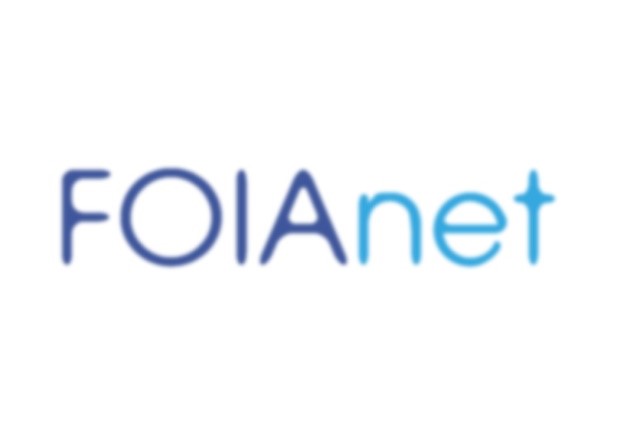
SDG 16.10.2 – Measuring RTI implementation – FOIAnet Methodology
SDG 16.10.2 - measuring RTI implementation Sustainable Development Goal (SDG) Indicator 16.10.2 calls on all States to adopt and implement RTI laws. To assist our members, FOIAnet developed a simple methodology for civil society organisations to use to assess implementation. It is designed to be something which members could apply relatively simply to obtain a [...]
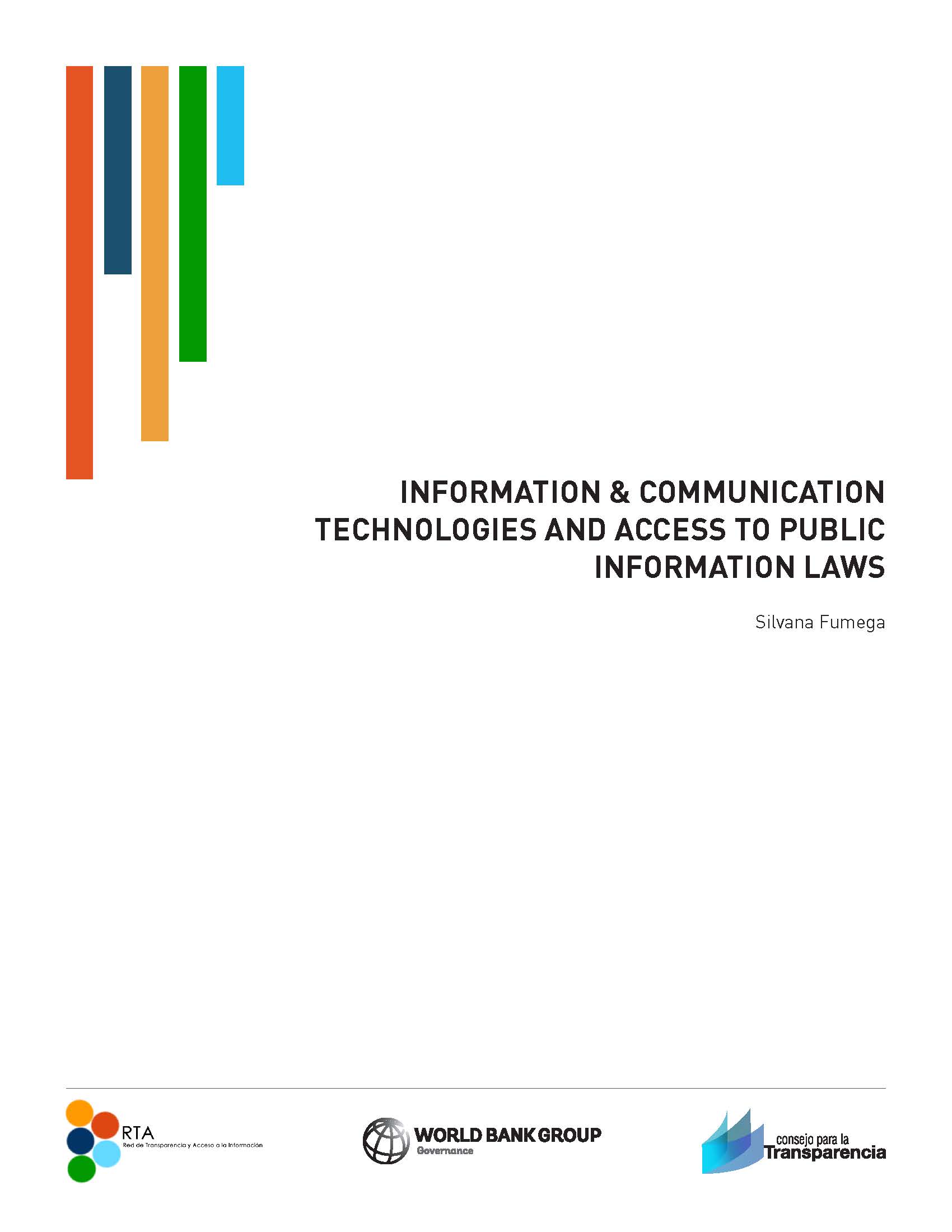
Note: Information & Communication Technologies and Access to Public Information Laws
After a brief overview of the evolution of ATI laws in Latin America, this note deals with various key aspects of the three above-mentioned countries’ portals. Following the overview, the note is divided into several sections based on the main aspects of the portals: characteristics, design, implementation, use, and training and promotion. In English In [...]
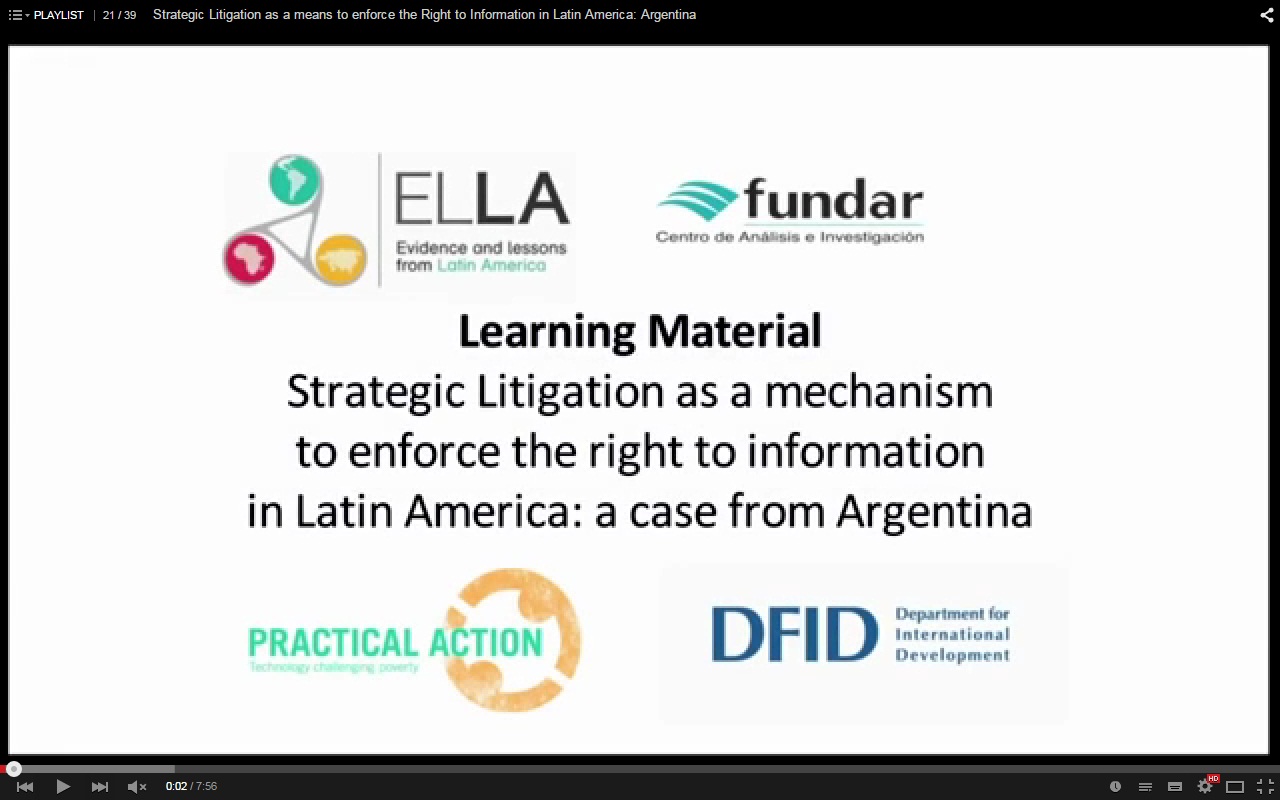
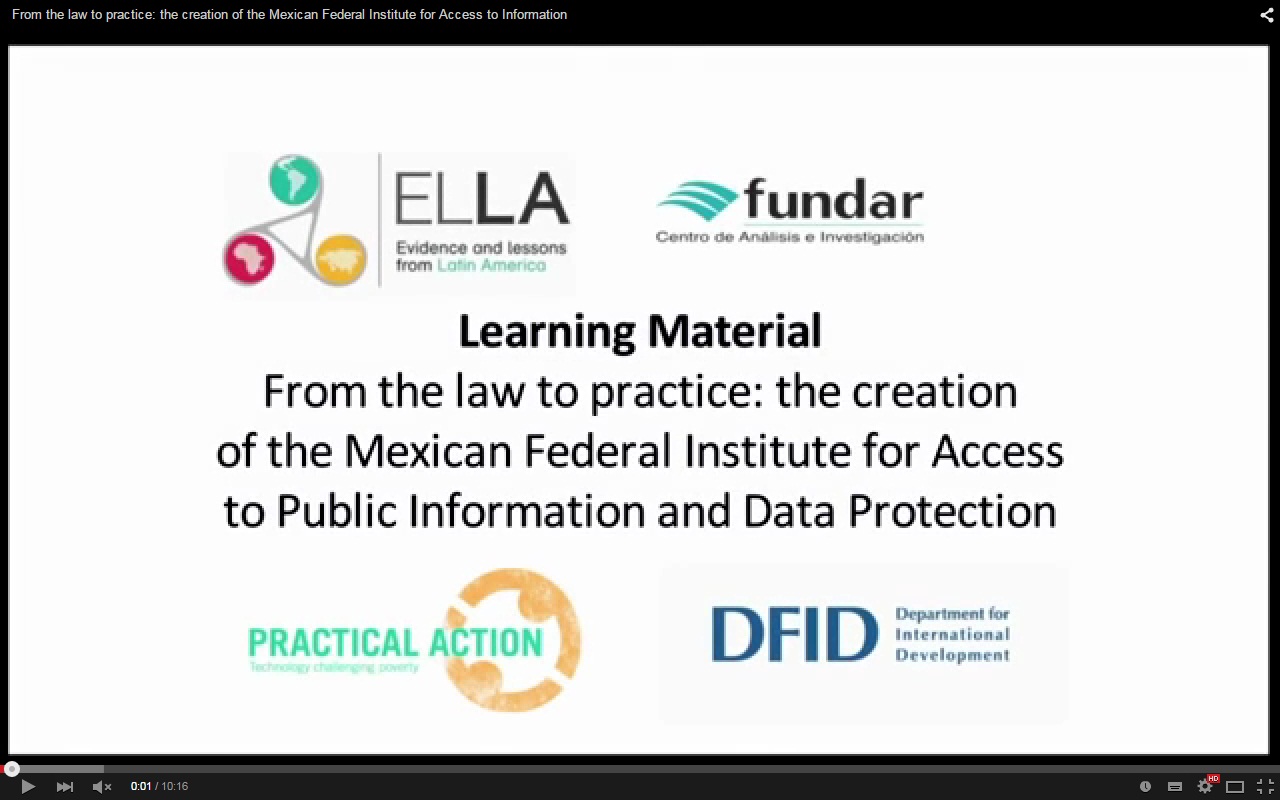

Documentary – Opportunities and Challenges in Access to Public Information: Experiences in Latin America
Documentary: Opportunities and Challenges in Access to Public Information: Experiences in Latin America

The Role of the Inter-American Human Rights System in the Promotion of the Right to Information
SUMMARY - The Inter-American Human Rights System has played a fundamental role in promoting the right to information in Latin America. This learning material describes the mandate and composition of this system and describes its two main outcomes regarding the right to information: the Model Inter-American Law and the Inter-American Court’s paradigmatic rulings on access [...]

Where do we stand? The situation of the right to information and transparency in Latin America
Karina Banfi, Executive Secretary of the Alianza Regional para la Libertad de Expresión e Información (Regional Alliance for the Freedom of Expression and Information), talks to us about the need to approve and implement Freedom of Information Acts (FOIAs) to increase transparency and improve accountability in Latin America. She describes the region’s evolution regarding access [...]

Guide – The Latin American Approach to Transparency and Access to Information
SUMMARY - By providing greater access to public information and promoting transparency, Latin American countries seek to improve social oversight, inform citizens about government policies and programmes, advance other human rights, reduce corruption and enhance overall accountability. This ELLA Guide analyses various initiatives implemented in the region, as well as the key role played by civil society in the Latin American experience, while [...]

Policy brief – Fighting Corruption by Improving Transparency and Access to Information
SUMMARY - Using Information and Communication Technologies (ICTs), in the last decades countries such as Argentina, Brazil, Chile, Guatemala, Mexico, Panama and Paraguay have designed and created electronic platforms that make information about procurement and government officials’ personal assets public. These electronic platforms have guaranteed an effective and transparent flow of public information, thereby empowering citizens to identify and demand action against corruption [...]

Practice brief – Using Information for Accountability and Justice
SUMMARY - Throughout Latin America, civil society organisations (CSOs) are exacting accountability by undertaking independent assessments of the implementation and outcomes of public policies and programmes. To get the information needed for these assessments, CSOs have used the Right to Information guaranteed by Freedom of Information Acts (FOIAs), Constitutions or Court decisions. By conducting these exercises, civil society has highlighted mismanagement and inefficiencies [...]

Practice Brief – Civil Society’s Regional Network for Advancing Freedom of Expression and Access to Information
SUMMARY - The Regional Alliance for the Freedom of Expression and Information (the Alliance), an innovative civil society network, has had a major role in promoting freedom of expression and the right to information regionally. The Alliance coordinates the efforts of 23 civil society organisations (CSOs) from 19 American countries and carries outextensive advocacy work at the regional level.1 This [...]

Citizen Assessment of Budget Transparency: Latin American Budget Transparency Index
SUMMARY - Civil society organisations (CSOs) developed a new benchmarking exercise to assess and compare levels of budget transparency across countries in order to address a specific transparency problem: budget information may be available, but it is not useful. Since 2001, CSOs and academic institutions have implemented the Latin American Budget Transparency Index (Índice Latinomericano de Transparencia Presupuestaria - LABTI) to [...]

Policy Brief – Building the Legal Framework to Support Trasparency and Access to Information in Latin America
In the last two decades, Latin American countries - including Brazil, Chile, Colombia, Ecuador, El Salvador, Guatemala, Honduras, Jamaica, Mexico, Nicaragua, Panama, Peru and Uruguay, among others - have designed and adopted Freedom of Information Acts (FOIAs). These FOIAs have increased transparency of government actions, ensured citizens’ right to request and access public information, and enhanced overall accountability. This Brief describes [...]
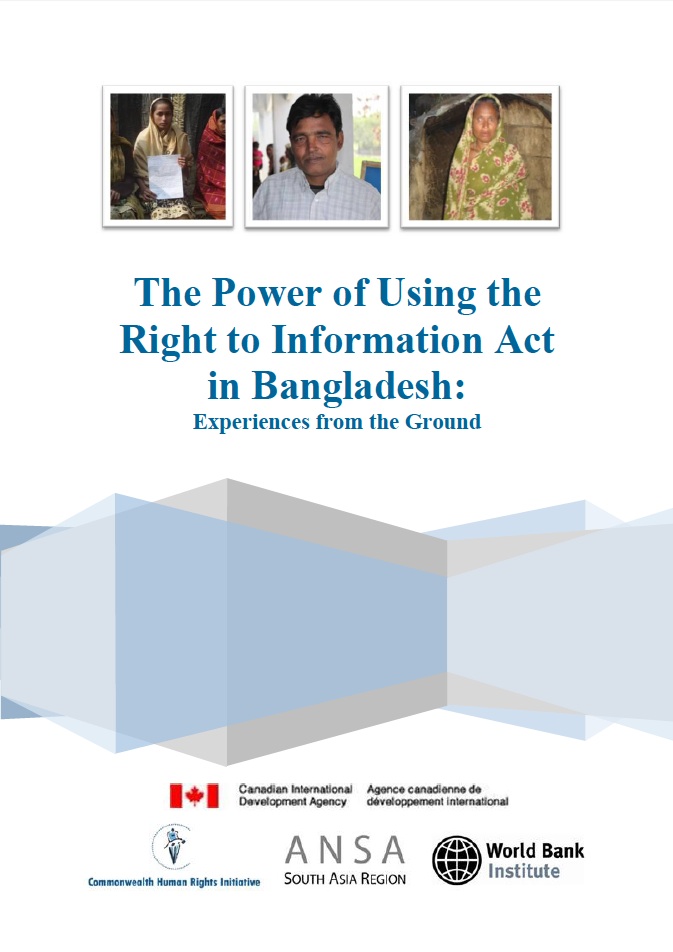
The Power of Using the Right to Information Act in Bangladesh: Experiences from the Ground
Fifteen cases from Bangladesh to showcase how an abstract law can become relevant and useful for everyday citizens, while building the capacity of NGOs to document their experiences for further dissemination.
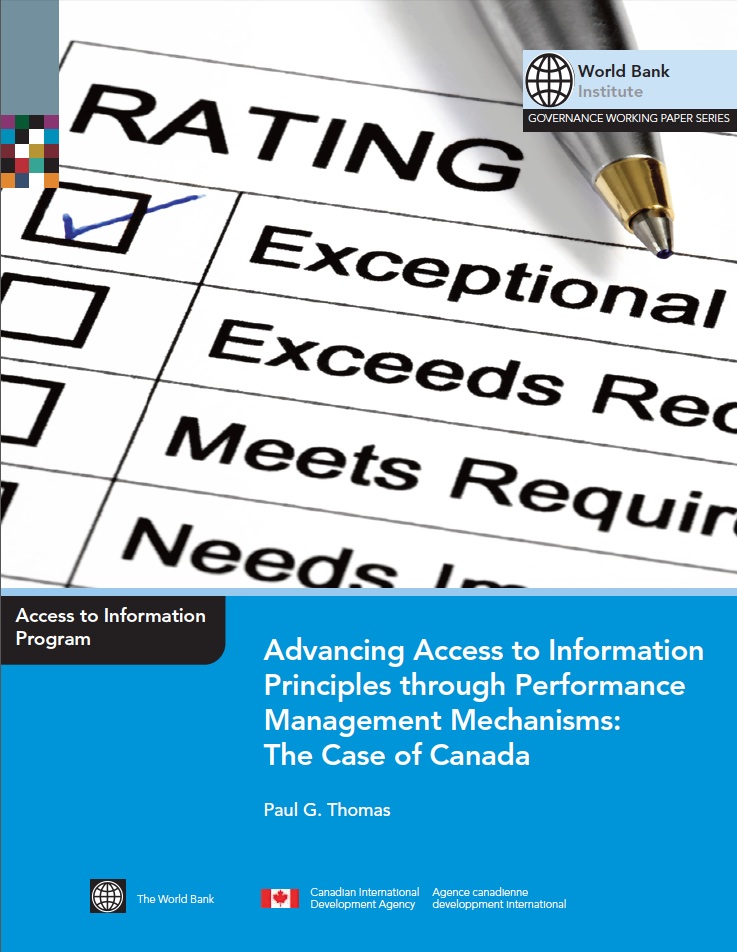
Advancing Access to Information Principles Through Performance Management Mechanisms: The Case of Canada
On the basis of a detailed case study of the government of Canada, this report examineshow management accountability processes operating within public services may contribute to the promotion and enforcement of access laws.
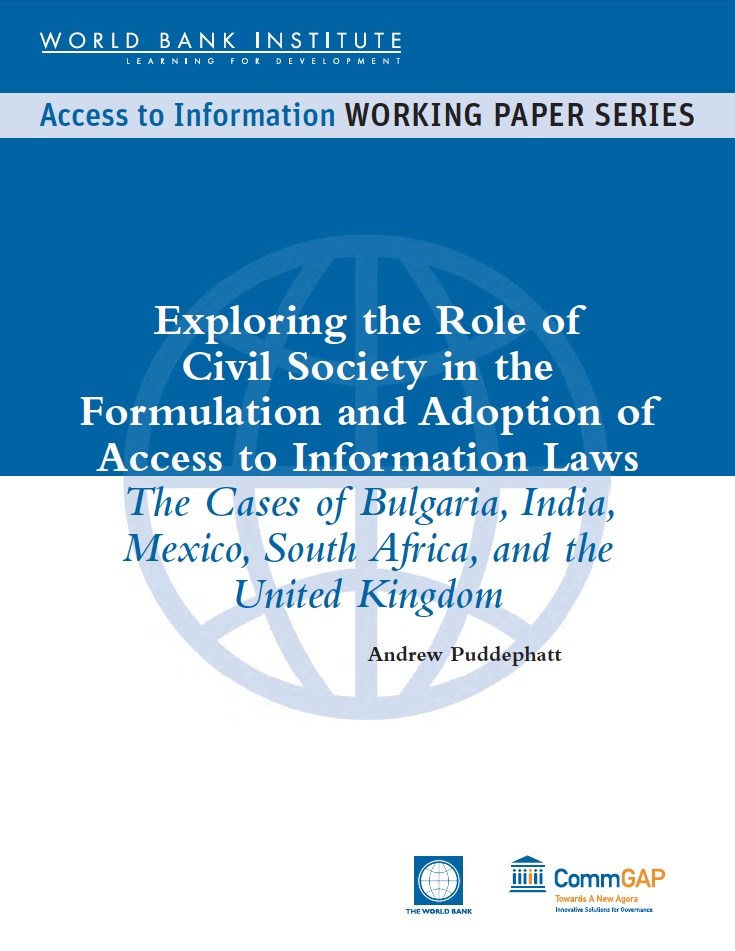
Exploring the Role of Civil Society in the Formulation and Adoption of Access to Information Laws: The Cases of Bulgaria, India, Mexico, South Africa, and the United Kingdom
Exploring the Role of Civil Society in the Formulation and Adoption of Access to Information Laws: The Cases of Bulgaria, India, Mexico, South Africa, and the United Kingdom
This paper analyzes civil society’s contribution to the adoption of access to information laws in five countries.

Enforcement Models. Content and Context
The paper defines three distinct models for enforcing ATI legislation, the considerations applied in designing and selecting the models, and some of the key factors related to the proper functioning of the system, through the use of illustrative case examples.
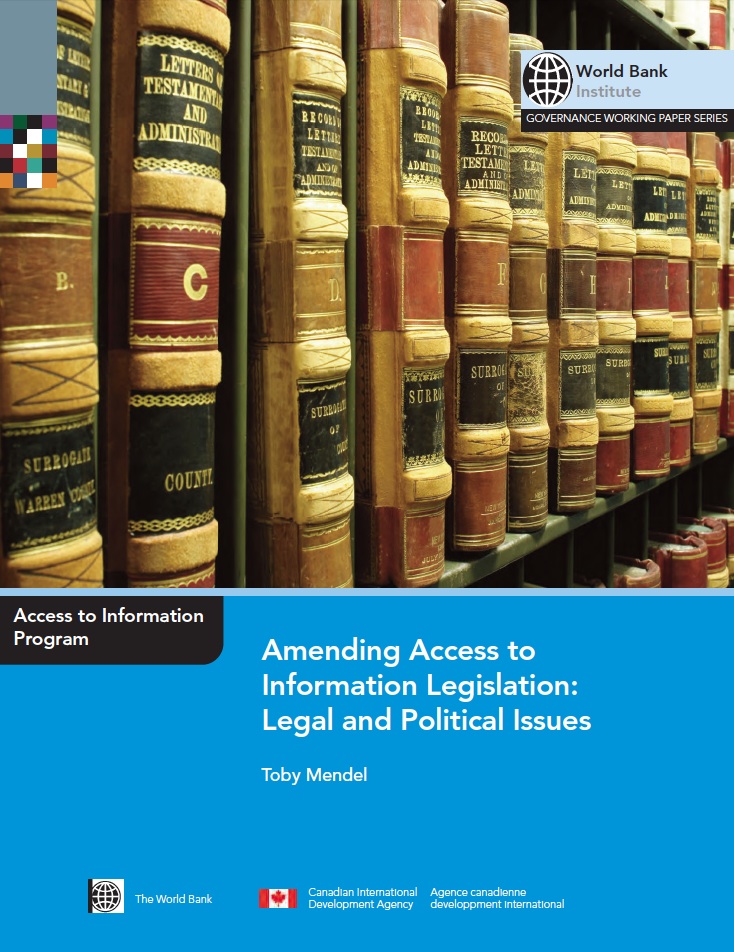
Amending Access to Information Legislation: Legal and Political Issues
This paper is about efforts to amend the legal framework for the right to information, with a particular focus on access to information (ATI) laws.
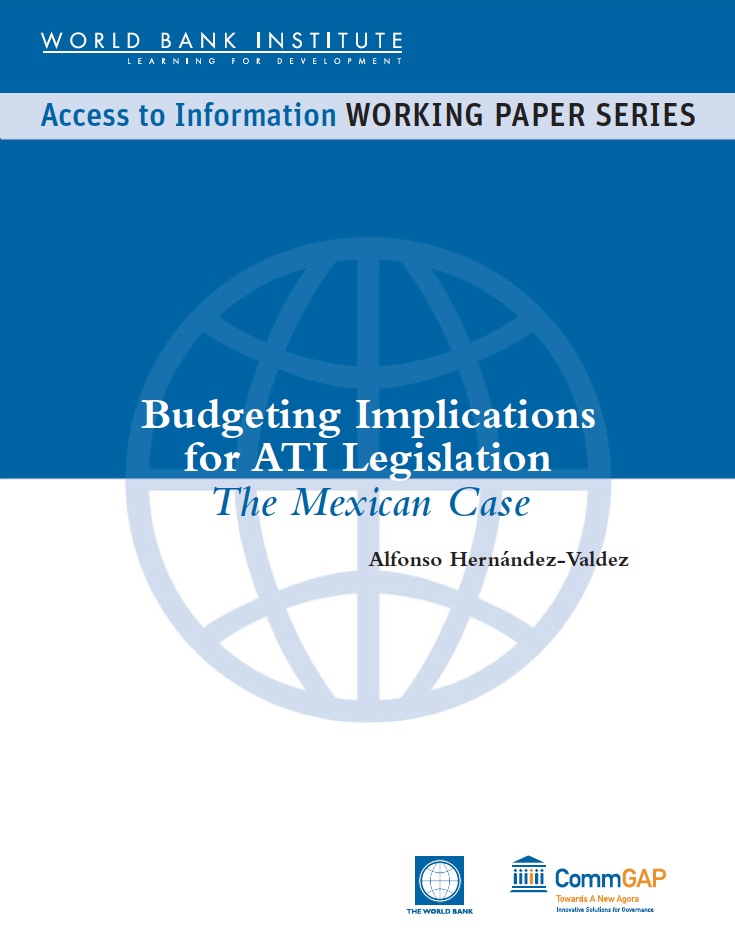
Budgeting Implications for ATI legislation: The Mexican Case
The paper analyzes the budgeting implications of implementation of access to information legislation in Mexico.
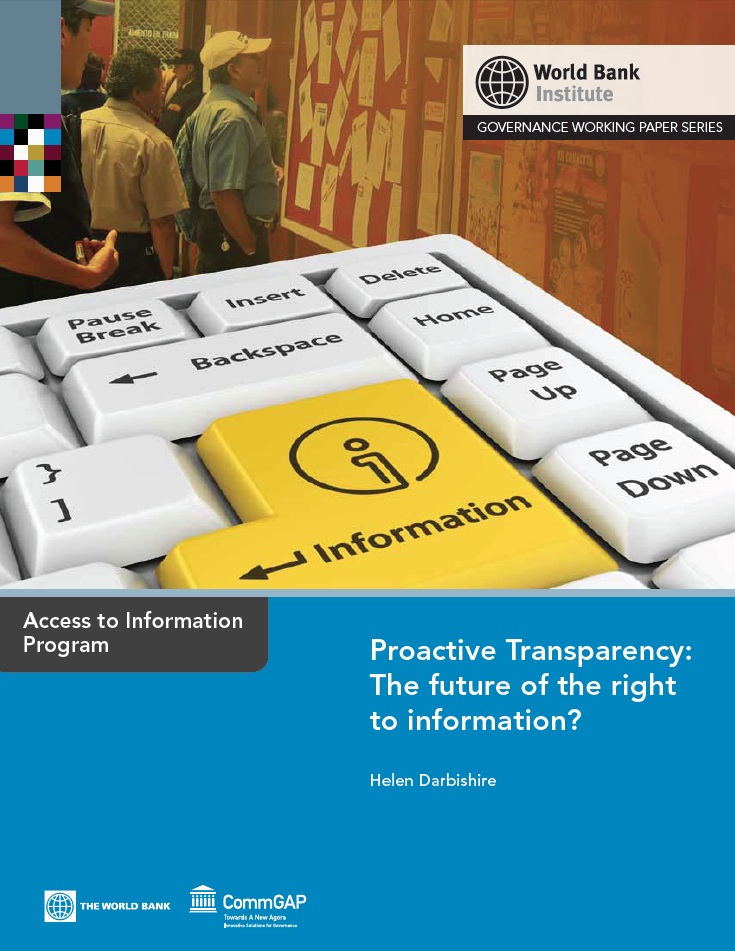
Proactive Transparency: The Future of the Right to Information?
The paper reviews the development of, and the emerging standards for proactive disclosure.
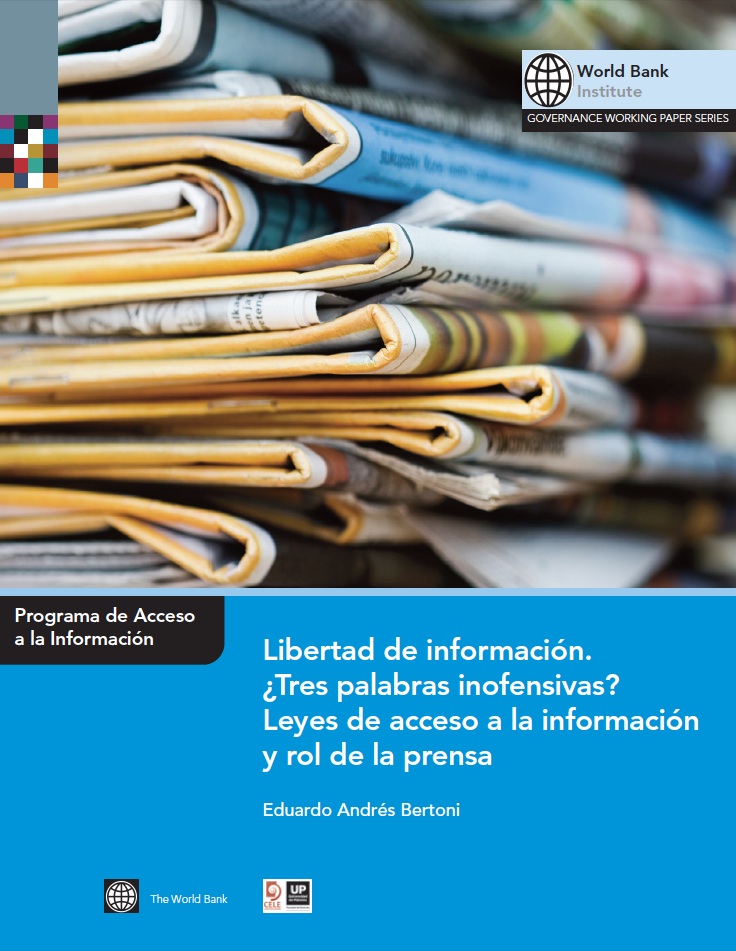
Libertad de información. ¿Tres palabas inofensivas? Leyes de acceso a la información y rol de la prensa
La aprobación e implementación de nuevas leyes sobre acceso a la información pública se incrementó notablemente en los últimos años. Esta investigación documenta y analiza la relación entre la prensa y el derecho de acceso a la información pública.
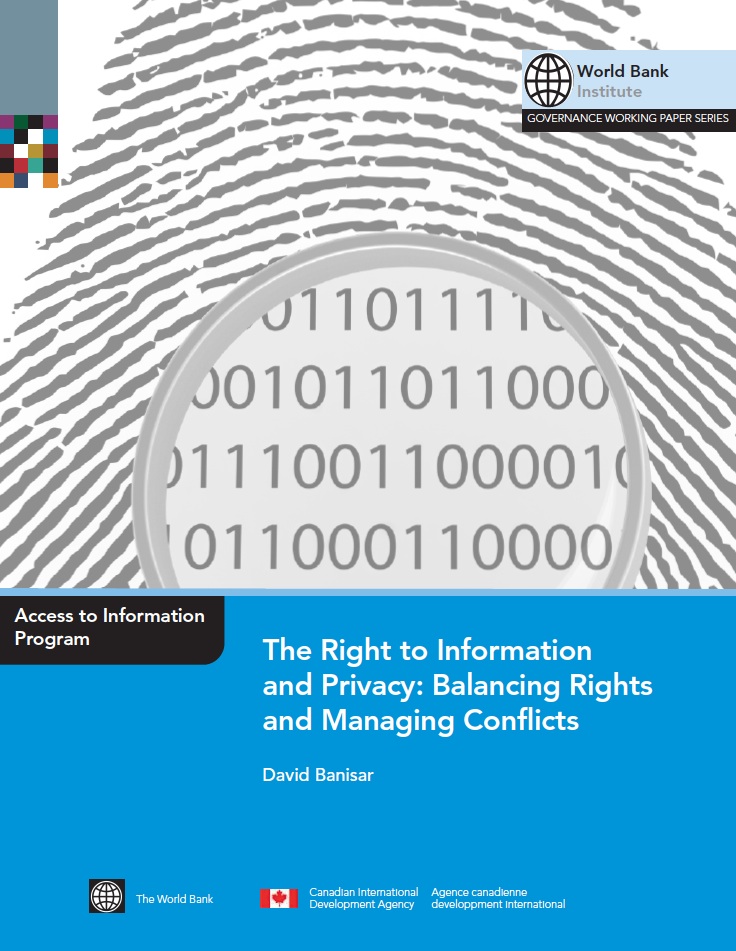
The Right to Information and Privacy: Balancing Rights and Managing Conflicts
The paper examines legislative and structural means to better define and balance the rights to privacy and information.
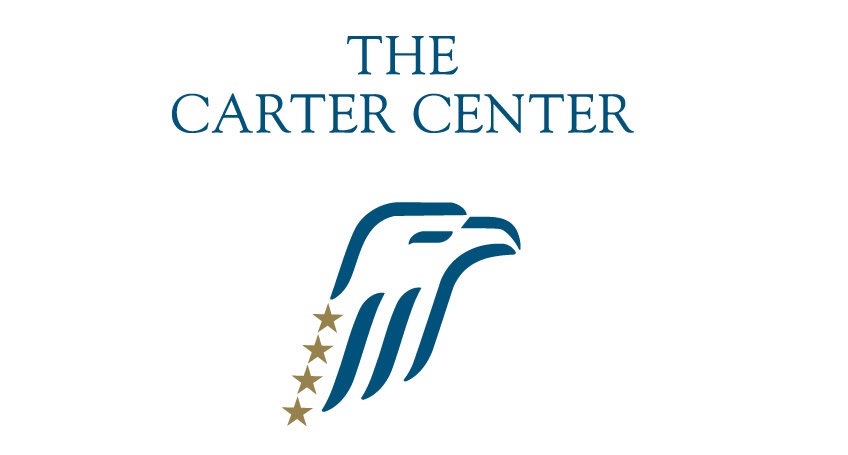
Carter Centre Access to Information and Transparency Events Calendar
To enhance cooperation and coordination, the Center's Global ATI Initiative has developed the international access to information and transparency calendar of events, including posts on conferences, workshops, summits, retreats, and training sessions. If you would like to post an event, please click here www.cartercenter.org/accesstoinformation.
10-10-10 Statement
To mark the 10th anniversary of International Right To Know Day on 28 September 2012, FOIAnet issued this 10-10-10 Statement, setting out the Network's ten main achievements over the last ten years, its ten main challenges, and its ten core goals for the next ten years. In English (PDF) En Français (PDF) En Español (PDF) In [...]
IDRC Report – Uganda
Uganda RTI Report by the IDRC and Greenwatch Uganda
IDRC Report – South Africa
South Africa RTI Report by IDRC and ODAC
IDRC Reports – Ghana
Ghana RTI Report created by IDRC and CDD Ghana

Booklet for tracking Freedom of information requests by communities
Complex monitoring templates including online systems have been used by civil society groups all over the world to monitor and track the results of Freedom of information requests. However communities often need a simple tool to record what has happened to their Freedom of information requests once sent to government agencies. Methods to track the [...]
The Jakarta Declaration
The Jakarta Declaration marks an important step forward for improving access to information about air and water in Asia. This comprehensive Declaration provides governments with concrete ideas for boosting access to information and safeguarding citizens from projects that may negatively impact air and water quality. But a roadmap is only worthwhile if it’s actually used. [...]

Top 10 things to do in first six months to implement a Freedom of information law
The Access Initiative has come up with a list of top ten actions that governments should consider when they are beginning implementation. This list may also be used as a tool by civil society to monitor government implementation practices. http://www.accessinitiative.org/blog/2011/09/top-10-things-do-first-six-months-implement-a-freedom-information-law-one-view
FreedomInfo.org
http://www.freedominfo.org freedominfo.org is a one-stop portal that describes best practices, consolidates lessons learned, explains campaign strategies and tactics, and links the efforts of freedom of information advocates around the world. It contains crucial information on freedom of information laws and how they were drafted and implemented, including how various provisions have worked in practice.
Visualising Information for Advocacy
https://visualisingadvocacy.org/ Visualising Information for Advocacy is an online platform providing visualization tools and tips for advocates and activists to use in their campaigns. They have also published a book containing 50 case studies for understanding and using visual information.
Security in a Box
https://www.securityinabox.org/ Security in-a-box is a project by Tactical Technology Collective and Front Line Defenders, with the aim to reinforce the digital security and privacy needs of human rights defenders. Its website includes extensive information on digital security issues, as well as instructions on how to use software tools to protect your information.
School of Data
http://schoolofdata.org/ School of Data works to empower civil society organisations, journalists and citizens with the skills they need to use data effectively in their efforts to create more equitable and effective societies.
Right2Info.org
http://www.right2info.org/ Right2INFO brings together information on the constitutional and legal framework for the right of access to information as well case law from more than 80 countries, organized and analyzed by topic.
CarterCenter.org
www.cartercenter.org/accesstoinformation The Carter Centre is a Non-Governmental Organisation based in Atlanta, US that is guided by a fundamental commitment to human rights and the alleviation of human suffering. The Center has helped to improve life for people in more than 80 countries by resolving conflicts; advancing democracy, human rights, and economic opportunity; preventing diseases; improving [...]
Level Up
https://www.level-up.cc/ Level Up is an organization committed to digital safety. It explores advice from fellow digital safety trainers, offers workshops or the opportunity to start your own workshop, and aims to enrich the resources available to the global digital safety training community.
FrontLineDefenders.org
http://www.frontlinedefenders.org/about-front-line Front Line Defenders is a Human Rights Organisation based in Dublin, Ireland. It is committed to addressing the protection needs identified by non-violent defenders of human rights, as they are enshrined in the Universal Declaration of Human Rights (UDHR).
DataKind.org
http://www.datakind.org/ Data Kind brings together high-impact organizations dedicated to solving the world’s biggest challenges with leading data scientists to improve the quality of access to and understanding of data in the social sector.
AccessNow.org
https://www.accessnow.org/ Access is an International Human Rights Organisation, defending and extending the digital rights of users around the world. By combining innovative policy, user engagement, and direct technical support, they fight for open and secure communications for all.
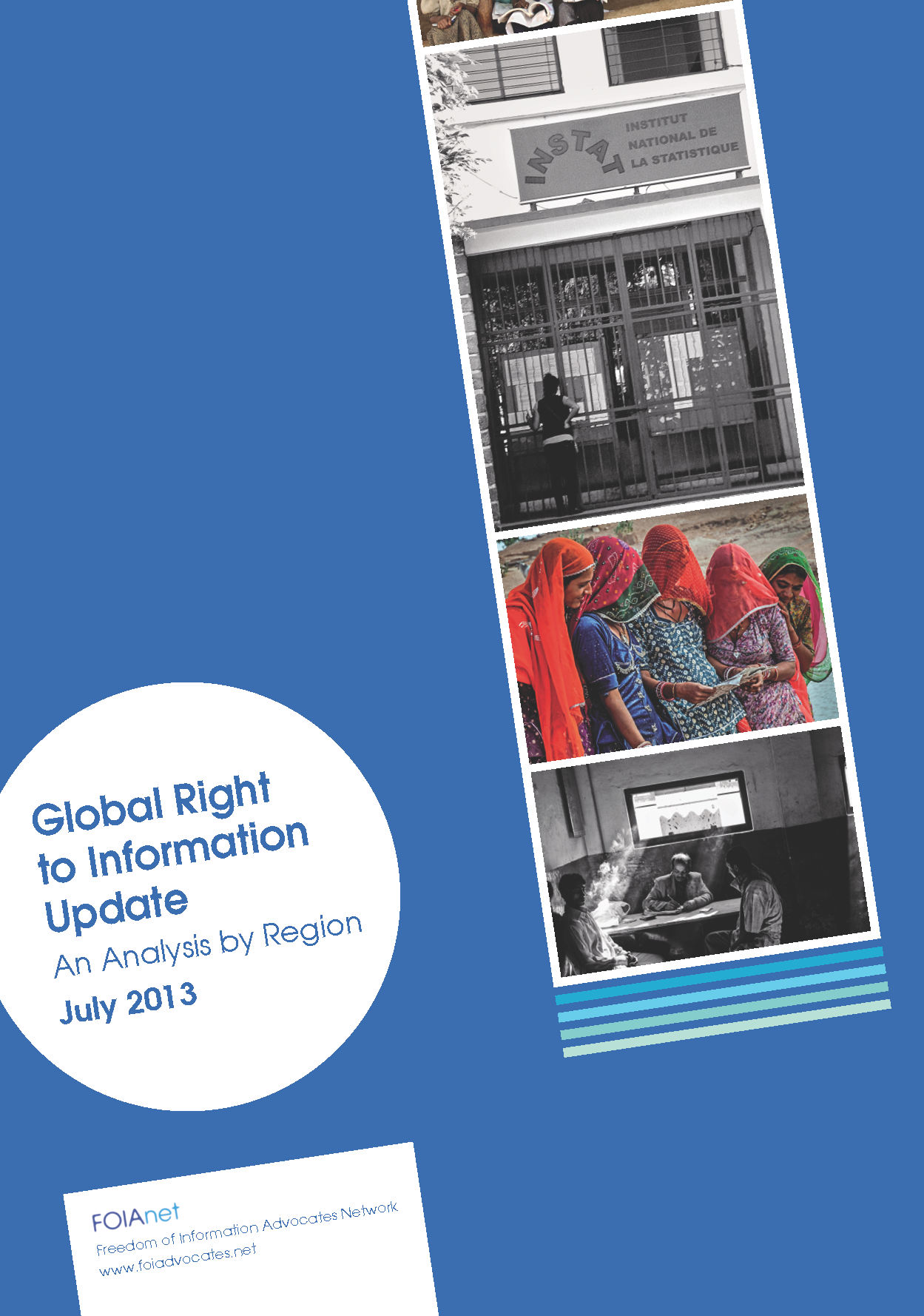
Global Right to Information Update: An Analysis by Region
8 July 2013 - Today, the Freedom of Information Advocates Network (FOIAnet) launched a major global analysis of the development of the right to information (RTI) movement, broken down by region. The publication follows FOIAnet’s celebration of its 10th anniversary on International Right to Know Day, 28 September 2012. The Update, which was co-authored by [...]
